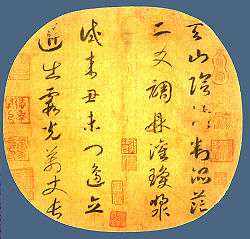Emperor Gaozong of Song
| Gaozong 高宗 | |||||||||||||
|---|---|---|---|---|---|---|---|---|---|---|---|---|---|
 | |||||||||||||
| Emperor of the Southern Song Dynasty | |||||||||||||
| Reign | 12 June 1127[1] – 24 July 1162[2] | ||||||||||||
| Retired Emperor of China | |||||||||||||
| Reign | 24 July 1162 – 9 November 1187 | ||||||||||||
| Born | 12 June 1107 | ||||||||||||
| Died | 9 November 1187 (aged 80) | ||||||||||||
| Spouse |
Empress Xing 邢皇后 Empress Wu 吳皇后 | ||||||||||||
| Issue |
Zhao Fu, Crown Prince Yuanyi 元懿太子趙旉 and 5 daughters | ||||||||||||
| |||||||||||||
| Dynasty | Song Dynasty | ||||||||||||
| Father | Emperor Huizong of Song | ||||||||||||
| Mother | Empress Xianren | ||||||||||||
Gaozong (12 June 1107 – 9 November 1187), born Zhao Gou, was the tenth emperor of the Song dynasty of China. He reigned from 1127 to 1162. Gaozong fled south after the Jurchens overran Kaifeng during the Jingkang Incident of the Jin–Song wars and became the first emperor of what is now known as the Southern Song dynasty after he re-established his seat of government at Lin'an (present-day Hangzhou in Zhejiang).
Biography
Gaozong was the 9th son of Emperor Huizong and the younger half-brother of Emperor Qinzong. His mother was a concubine from the Wei (韋) family who later became empress dowager and is known posthumously as Empress Xianren (顯仁皇后; 1080–1159).

Gaozong was originally a regional lord in the Northern Song dynasty. After the preceding emperors Qinzong and Huizong were captured by the Jin during the Jurchen campaigns against the Song, he became the emperor of China and established the Southern Song empire. The Great Chu dynasty, a puppet state created by the Jin, was abolished when Zhang Bangchang submitted to Gaozong. During his reign, the Jurchens often attacked his realm. Initially, he used military officials such as Li Gang, Zong Ze, Yue Fei, Han Shizhong, and Yu Yunwen to hold the Jurchens at bay. However, after years of fighting and significant military success, Gaozong settled on a pacifist stance.[4] One of the major reasons behind this was that Gaozong and the premier Qin Hui did not want the Song army to defeat the Jurchens, as this might result in Emperor Qinzong being restored to the throne. As a result, Gaozong and Qin plotted to frame Yue Fei for some ambiguous offence and had him put to death. General Han Shizhong was also dismissed from his military duties. Gaozong then signed the Treaty of Shaoxing with the Jurchens which recognize their right to their conquests exchange for peace.
Gaozong was also a notable poet and had significant influence on other Chinese poets. Among his surviving works is "Quatrain on Heavenly Mountain".
Gaozong abdicated in 1162 after reigning for more than 35 years but lived on until 1187. He was 80 when he died. His temple name means "High Ancestor".
Titles from birth
- His Imperial Highness The Prince of Kang 康王
- His Imperial Majesty The Emperor
- His Imperial Majesty The Retired Emperor 太上皇
Wives
- Empress Wu (1115–1197), was first given the title Lady of the Heyui Commandery (和義郡夫人), eventually became empress after the announcement of the death of Empress Ying
See also
- Yue Fei
- List of Song Emperors
- Jurchen campaigns against the Song Dynasty
- Architecture of the Song Dynasty
- Culture of the Song Dynasty
- Economy of the Song Dynasty
- History of the Song Dynasty
- Society of the Song Dynasty
- Technology of the Song Dynasty
- Tang Clan
Notes
- ↑ Following the capture of his older half-brother Emperor Qinzong in January 1127 by the Jurchen invaders, he was proclaimed emperor on 12 June 1127 in the Song southern capital. He was deposed for 25 days between 26 March and 20 April 1129 by generals Miao Fu (苗傅) and Liu Zhengyan (劉正彥). Restored, he was pursued by the Jurchen forces of the Jin dynasty (1115–1234) and was not in full control of Southern China until the late 1130s.
- ↑ Abdicated in favor of the son of a distant cousin whom he had adopted. Granted himself the title Taishang Huang (太上皇) and continued in practice to rule through the new emperor.
- ↑ Final version of the posthumous name given in 1191.
- ↑ Peter Allan Lorge (2005). War, politics and society in early modern China, 900–1795. Taylor & Francis. p. 55. ISBN 0-415-31690-1. Retrieved March 2, 2012.
He therefore intiially brought the belligerent Li Gang back into government to reassure the officials and generals of his intent to resist the Jurchen and perhaps recapture the north, and then sacked Li and brought in officials more concerned with Gaozong's personal authority. . .The military situation began to change, however, as Song loyalist forces became more coordinated and competent generals emerged to deal the Jurchen several defeats. Jurchen armies also began to run into the usual operational problems that diminished the power of steppe arimes on extended campaigns. Even in economically-developed areas, an army that lived off the land could not return through the same place it had just looted. As Jurchen soldiers became more encumbered with loot, they became less mobile and less interested in further campaigning, though they might be more willing to reutrn in the future. Southern China was also much less favorable for cavalry than northern China, and the Jurchen had to cross not only numerous small rivers and canals but also the Huai and Yangzi rivers.
| Emperor Gaozong of Song Born: 12 June 1107 Died: 9 November 1187 | ||
| Regnal titles | ||
|---|---|---|
| Preceded by Emperor Qinzong |
Emperor of the Song Dynasty 1127–1162 |
Succeeded by Emperor Xiaozong |
| Honorary titles | ||
| Vacant Title last held by Emperor Huizong of Song |
Retired Emperor of China 1162–1187 |
Vacant Title next held by Emperor Xiaozong of Song |
| ||||||||||||||
|